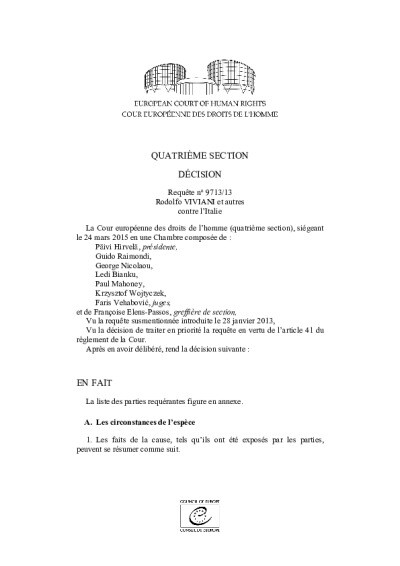
Date
Geographical Area
Europe
Countries
Italy
Keywords
Jurisdiction
European Court of Human Rights (ECHR)
Case Name
Viviani & Ors v Italy
Case Reference
Application no. 9713/13
Name of Court
European Court of Human Rights
Key Facts
The applicants reside in various municipalities located near Mount Vesuvius, an active volcano currently dormant near the city of Naples. The municipalities have been classified as “red” because of the risk of an eruption. The red zone is inhabited by approximately 800,000 people, and it was stated that a lot of buildings and dwellings were built improperly.
The applicants claimed no detailed safety plan, including safety routes in the event an earthquake occurs, had been implemented. They alleged there is a lack of information on how they are to respond to an earthquake or volcanic eruption if it does occur and state that there is no early warning system in place. The volcano monitoring system is managed by the National Institute of Geophysics and Volcanology and by the Vesuvius Observatory. The Government stated that a report had been undertaken to implement emergency measures and that in 1991 a Commission was established which was responsible for establishing risks linked to an eruption of Vesuvius. A national emergency planning document was made in 1995 and updated in 2001.
Relying on Article 2 ECHR (right to life), the applicants complained that the Italian Government had failed to put in place a framework to protect their lives in the event of an eruption of Mount Vesuvius. The applicants also argued that their right to respect of their private life under Article 8 had been violated.
The applicants claimed no detailed safety plan, including safety routes in the event an earthquake occurs, had been implemented. They alleged there is a lack of information on how they are to respond to an earthquake or volcanic eruption if it does occur and state that there is no early warning system in place. The volcano monitoring system is managed by the National Institute of Geophysics and Volcanology and by the Vesuvius Observatory. The Government stated that a report had been undertaken to implement emergency measures and that in 1991 a Commission was established which was responsible for establishing risks linked to an eruption of Vesuvius. A national emergency planning document was made in 1995 and updated in 2001.
Relying on Article 2 ECHR (right to life), the applicants complained that the Italian Government had failed to put in place a framework to protect their lives in the event of an eruption of Mount Vesuvius. The applicants also argued that their right to respect of their private life under Article 8 had been violated.
Decision and Reasoning
The Court noted that it is responsible for monitoring compliance by the member states under the Convention, and must not replace the states which have the responsibility of ensuring that the fundamental rights and freedoms are enshrined. The Court referred to Article 35(1) of the Convention and noted that it could only be used after the exhaustion of domestic remedies. All applicants must give the domestic courts the opportunity to avoid or remedy the alleged violations. The Court noted that the applicants were free to lodge a request before the domestic authorities and that they could have brought a class action under a decree and law enacted in 2009.
Outcome
The Court declared the application inadmissible. The applicants did not exhaust domestic remedies within the meaning of Article 35(1).
Link
Disclaimer
This case law summary was developed as part of the Disaster Law Database (DISLAW) project, and is not an official record of the case.
Document
Document